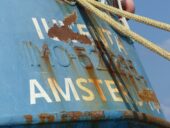Captains of private sea rescue ships are supposed to question rescued persons about their wish for asylum and ignore further emergencies. The United Nations and a new Bundestag report criticise these new Italian rules.
The Italian government coalition under the right-wing extremist Prime Minister Giorgia Meloni has tightened the requirements for private sea rescuers. Their ships are to head for a port immediately after rescuing people, without providing assistance to further sea emergencies. This is stipulated in a decree of 28 December, which provides for fines of up to 50,000 euros. The President of the Republic, Sergio Mattarella, enacted it today (PDF) under the title “Urgent Provisions for the Management of Migration Flows”.
Sea rescuers criticise the law as illegal. According to international law, captains are always obliged to rescue, the Berlin-based organisation Sea-Watch reminds in a statement. The new decree is therefore “an invitation to drown”. Many of the organisations in question operate their ships under the German flag, including Sea-Watch, Sea-Eye and SOS Humanity.
Italy also obliges captains to question those rescued about their wish for international protection and to report this to Italian authorities. However, access to fair asylum procedures includes translators, privacy at hearings, legal counsel and the provision of appropriate information. “All of this is not feasible on rescue ships,” Sea-Watch said.
There is also no basis in international law for the new regulations. This is the conclusion of an expert report by the Scientific Services in the Bundestag, which became public shortly before Christmas. “Despite the flag state principle, (rescue) ships are not part of the state territory,” it says. Accordingly, asylum applications could not be made on board a private ship.
There is no basis for the new regulations in international law either. This is the conclusion of an expert report by the Scientific Services in the German Bundestag, which became public shortly before Christmas. “Despite the flag state principle, (rescue) ships are not part of the state territory,” it says. Accordingly, asylum applications could not be made on board a private ship.
Headwind against the new regulations also comes from the United Nations High Commissioner for Refugees. “A private vessel assisting in the rescue operation is not an appropriate place for determining a claim to asylum,” concludes a position paper dated 1 December. The state responsible for asylum applications is the one in whose territory an asylum seeker is located.
This is also the view of the Italian Commissioner for the Rights of Persons Deprived of Liberty, who is also competent for asylum seekers. The responsibility for accepting or rejecting asylum applications should not be placed on the flag states, according to a statement published last week. Such a regulation would violate an article in Protocol No. 4 of the European Convention on Human Rights. This prohibits the “collective expulsion of foreign persons”.
The Italian government wants to put even more pressure on countries like Germany. One of their demands is that other countries should take in those rescued from ships flying their flag.
This, too, would violate international law, write the Bundestag researchers. “This would possibly be assessed differently if the rescue ship were a state ship,” the report says. So far, no EU state has implemented such a state rescue at sea. The coalition agreement of the German government states that the three ruling parties would “strive” for such a state-coordinated rescue operation in the Mediterranean.
However, states are subject to certain regulations on the disembarkation of people rescued by private ships flying their flag. Governments must “take appropriate measures” to ensure that other governments comply with international maritime, refugee and human rights law, writes the High Commissioner for Refugees.
Such backing could also be against the new decree. “We therefore expect the German government to protect the sea rescue organisations under the German flag from the illegal behaviour of the Italian authorities and to support us decisively in case of conflict,” Annika Fischer, director of the Sea-Eye association, demands in a press release.
Disembarkation must actually take place at a “port of safety”. According to the Bundestag report, this could also be outside the territorial waters of the state coordinating a rescue at sea. The UN paper emphasises that disembarkation in ports that are very far away from the place of the original rescue is questionable in terms of human rights.
However, the UN Commission also writes in its position paper that if rescued persons could not disembark “in a timely manner” in the responsible state, disembarkation or transfer to another state and access to an asylum procedure there “may be necessary” under certain circumstances.
“The fundamental responsibility under international law lies with the state in whose sea rescue zone the operation took place,” a spokesperson for Sea-Watch countered in response to a question from “nd”. International conventions allow landing in another state if it declares its willingness and the requirements of international law are met there. In fact, however, there is no such willingness on the part of other governments.
“The United Nations also sees the responsibility for the allocation of a safe port and the subsequent asylum procedures as lying with Italy and Malta,” Sea-Watch said.
After a sea rescue in the Mediterranean Sea, the boats left behind are marked by rescue organisations (Image: Nick Jaussi/ Sea-Eye).





Leave a Reply